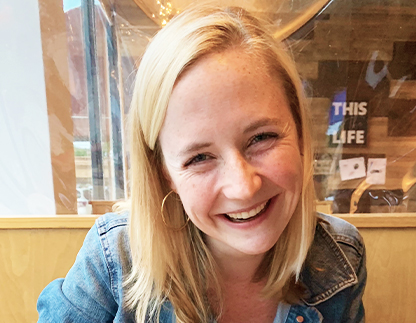It's been so fun to learn with students from all sorts of disciplinary backgrounds and to teach non-literary material that has been outside of my comfort zone so far this year.”
Elizabeth Winter
PhD Candidate in the Department of English

Elizabeth Winter is a PhD candidate in the Department of English in the Weinberg College of Arts and Sciences. Her research examines nineteenth-century British and Caribbean novels, with an emphasis on how literary discourse interacts with legal frameworks to construct and enforce racial categories. She is particularly interested in how issues of race, gender, and empire connect. Elizabeth was awarded a Mellon Cluster Fellowship in British Studies in 2019.
How would you describe your research and/or work to a non-academic audience?
In the nineteenth century, legal changes in Britain and its West Indian colonies granted people of color an increasing array of legal rights. In my work, I look at how British and Caribbean novels offered a literary response to these legal changes, specifically through their depictions of bi-racial people. More specifically, I examine how novels frequently use the trope of substitution and attempt to change two characters' places in order to ask how different the two characters really are.
Tell us what inspired your research and/or work.
During my undergraduate studies, I was really struck by Charlotte Bronte's novel Jane Eyre and Jean Rhys's powerful rewriting of that novel, Wide Sargasso Sea, over a hundred years later. Rhys's retelling recenters Bronte's famous British novel in the Caribbean and forces readers to reevaluate their understanding of its plot, characters, and British identity broadly. Soon, I was seeing the West Indies pop up in all sorts of British novels from the same period. I wanted to learn more about the relations between the two spaces and how power operated in these spaces along the lines of race and gender.
How do you unwind after a long day?
I like to relax by running along the lake or watching lots of reality TV. I've recently been enjoying the new season of Love Island.
What books are on your bedside table?
The Portrait of a Lady by Henry James. Some of my friends and I recently formed a book club and decided to read a book that was outside any of our areas of study, so we settled on this one.
What advice would you give your younger self or someone considering a similar path?
Over the years, I've been lucky to stumble into courses that sparked new interests and drastically reshaped my perspectives. Though I remember being very reluctant to take courses in political theory, French feminism, or 17th century poetry, each of these courses challenged me to think in new and different ways that have continued to impact me well into my graduate study. I think my advice would be to take advantage of opportunities like these to explore, experiment, and really dig outside your comfort zone.
Tell us about a current achievement or something you're working on that excites you.
I recently developed a syllabus for my spring course, "Doppelgängers and Dark Doubles.” After serving as a teaching assistant in Gender and Sexuality Studies, I'm excited to apply all I've learned to my own course. It's been so fun to learn with students from all sorts of disciplinary backgrounds and to teach non-literary material that has been outside of my comfort zone so far this year. In my course, I'm looking forward to returning to some literary texts (including Jane Eyre!) with a clear gender studies lens and to seeing what new ideas my students and I can uncover.
Published: May 2, 2023
If you know a graduate student, postdoctoral trainee, graduate faculty member, staff member, or a member of our TGS alumni population who would make a great candidate for our TGS Spotlight Series, please complete this brief TGS Spotlight Series Nomination Form.